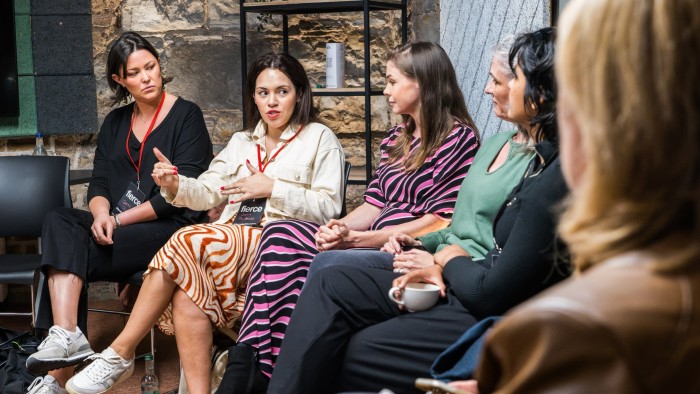Unlock the Editor’s Digest for free
Roula Khalaf, Editor of the FT, selects her favourite stories in this weekly newsletter.
With one in five residents born abroad, Ireland is fast becoming a multicultural nation. But diversity in the workplace is playing catch-up.
Although the number of women on the boards of the top 20 listed companies has doubled in the past five years, only half of the country’s workers feel their companies are representative of society when it comes to senior management, says the Irish Centre for Diversity. “Ireland has come a long way in the last 25 years,” notes Caroline Cummins, ICFD managing director. However, “a ‘diversity disparity’ remains when moving up the management hierarchy”.
There is also much more to do in terms of ethnic minority and disabled people, and other groups. A study this year of the insurance industry, one of the largest in Europe and a linchpin of Ireland’s financial services sector, found only 1.5 per cent of employees were disabled — a fraction of the national average.
At the same time, though, insurers were attracting, training and retaining employees from lower educational backgrounds, notes Sandra Healy, an Irish entrepreneur, tech engineer and organisational psychologist. Inclusio, her company, seeks to apply scientific rigour to analysing business culture and conducted the research. “If you don’t know who you have in the organisation, how can you build your culture and make sure you’re keeping them?” Healy asks.
In the wider financial services sector — of more than 103,500 employees at 9,000 companies, which include most top global financial institutions and makeIreland the third largest fund jurisdiction — gender remains the most common diversity and inclusion benchmark.
And, in gender terms, “compared to some other sectors, financial services is starting from a good place,” says Helen Russell, head of social research at the Economic and Social Research Institute, and co-author of the annual report on Ireland’s two-year-old Women in Finance Charter.
That government initiative to tackle gender imbalances in the sector has led, so far, to 41 per cent of senior managers and 26 per cent of chief executives being female — a four-point rise, in both cases, since 2022. “Shifting the dial a bit in such a short time is good improvement,” Russell says, while noting that, as you go up the corporate ladder, “the numbers [of women] keep decreasing.” The same is true for other minority groups.
“Every time you reach a goal, you’re looking to set the next goals to keep moving forwards,” says Tara O’Reilly, partner and head of asset management and investment funds at law firm Arthur Cox. Ireland’s funds sector — home to more than 70 per cent of the EU exchange traded funds market — is “not a bad place to be” in diversity terms, she adds, but “there’s not a sense ‘we’ve done well so we can take our foot off the pedal’”.
Lorraine Curham, operations head for the national start-up accelerator, NDRC, and founder of Fierce Women in Tech, says female entrepreneurs still get told: “We don’t invest in women because you are of child-bearing age — it can be as blunt as that.” But she urges women not to get bogged down in a “victim mentality”.
“We, as a society, need to understand that a lot of cheques are being signed by white men of a generation when women couldn’t have a job, a bank account or an abortion,” Curham says. A bar on married Irish women in the civil service, only lifted in 1973, was also observed by many companies. “How we make change happen is to make it easy for them,” she argues.
For Healy, that includes identifying “systemic things that are stopping a particular group progressing”. Inclusio’s platform provides information companies can act on, such as how having children, or caring responsibilities, impacts men’s and women’s work-life balance differently, she says. Healy adds that it has helped Irish insurer FBD transform high employee dissatisfaction levels and boost profits. Inclusio launched this month an initiative to train staff at Ireland’s three high-street banks to engage with diverse colleagues and customers in a more inclusive way.
Deirdre Gavin, head of inclusion and diversity at Bank of Ireland, the country’s biggest bank by assets, says neuro inclusivity is a focus. “It’s about being truly inclusive,” she adds, noting that almost one person in 10 in Ireland identifies as neurodivergent.
Diversity also matters because of Ireland’s importance to US investors, says Fernando Vicario, chief executive of Bank of America Europe. He sees it as “an unstoppable trend” but with much more to achieve.
Meanwhile, at Dublin start-up, Sunstone Technologies, founder and chief executive Roger Courtney is using AI to overhaul traditional classification of economic activity in Ireland in an effort to help companies identify bigger potential markets. The data, he adds, will also deliver insights into diversity by revealing gender gaps in directors’ pay and, thus, “more about what companies can — and should — do”.
Read the full article here

